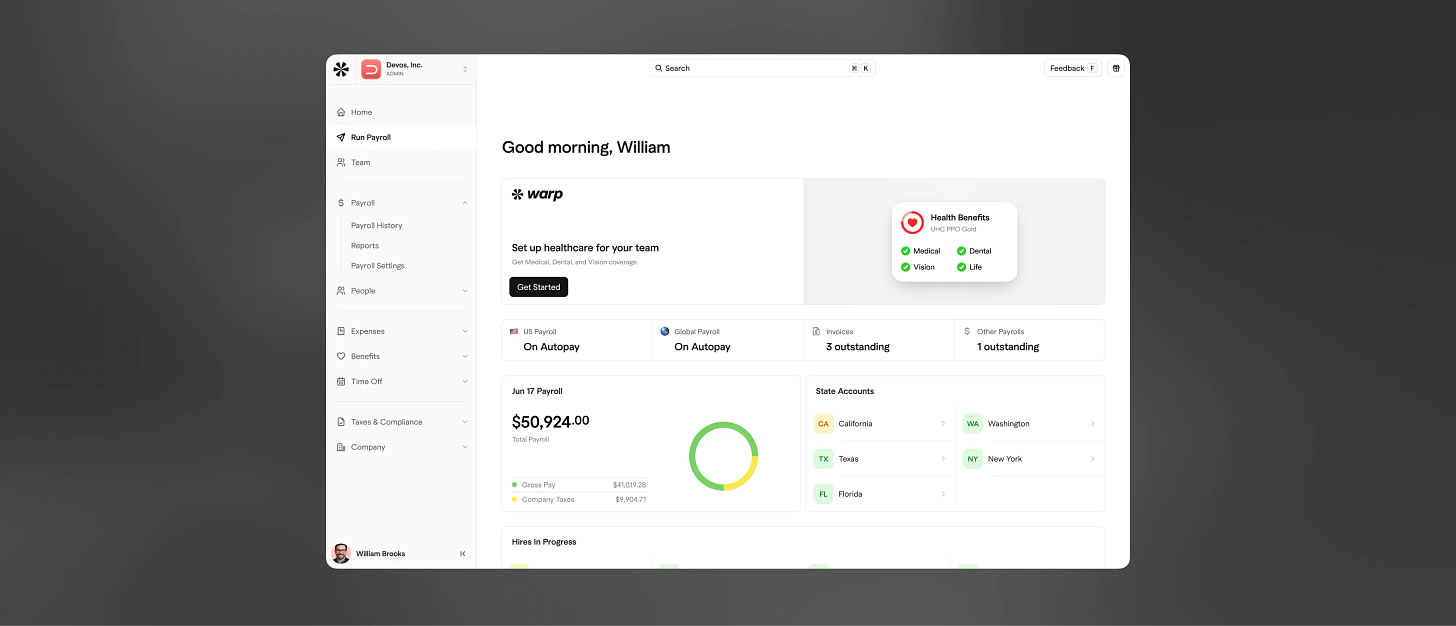How a small team now has 100s of customers and millions in revenue
Spotlight on Warp Payroll
✨ Hey there this is a free edition of next play’s newsletter, where we share under-the-radar opportunities to help you figure out what’s next in your journey.
There’s a great story from Brian Chesky about the early days of Airbnb. Paraphrased, he says something like: “We used to go door-to-door to the first hosts on the platform, photographing apartments and onboarding new customers. We used this time to ask hosts directly what we could do better. For many years, we continued this process, going door-to-door and manually uploading all of the photos, making sure customers had a great experience. Years later, we automated the process based on our learnings.”
There’s a lot to learn from this story.
The primary lesson, which is quite well known, is that you as a founder (or early employee) should be prepared to “do things that don’t scale.” You should be prepared to roll up your sleeves and do manual work in the early days as you build the foundation of your business and product.
But there’s another, more subtle lesson in the story that a lot of people miss - it is right there in the last line of the paragraph: “Years later…we automated the process.” While it can be great to do things that don’t scale, at some point, at least if things are going well, you will need to figure out how to scale, ideally without compromising the customer experience.
Many founders and companies delay this process for far too long - investing in large sales and customer success teams to compensate for missing features instead of fixing their product directly. For a company that has raised lots of capital, it often seems like the solution to your problems to just hire lots more humans. But, and you would know this if you ever worked for a bloated organization, this rarely solves the issue and in fact can really make things worse.
This is what Ayush Sharma, the founder/CEO of Warp, says happened in the HR/payroll software space. “We realized that every existing payroll solution was just manual work dressed up with software. Same complexity, same errors, same time drain—just with a nicer interface.”
Ayush and the Warp team have set out to solve this problem at its root - by building an automated platform that understands the requirements for 10,000+ tax jurisdictions without any human intervention. They took a very product-centric approach to scaling - rather than over-hire and over-spend, they made sure to automate every bottleneck in their system.
It seems to have worked - customers can now set up their HR, payroll, and tax compliance in just 10 minutes. They now support hundreds of customers - from 2-person startups to companies with 100s of employees - on all things payroll, tax compliance, and HR. And they, backed by $24 million (including a recently announced Series A!), are hiring for 10 roles across all departments: operations, GTM, design, engineering, and more.
We got in touch with Warp about us covering them in a Spotlight because we wanted to understand their approach. How do you build a company that gains traction in an already crowded space? How do you prioritize building features that compound in value over time instead of wasting money and time on unscalable processes? And perhaps most importantly - really the focus of our Spotlight series - how do you build a company and culture that fosters this sort of productive environment?
All that and more in the Spotlight below. Major thanks to the Warp team for sharing behind the scenes details and supporting Next Play.
If you had to guess, how many people would you think work at Warp?
They have hundreds of customers. They offer several complicated products (like payroll and tax compliance). They have millions in revenue.
Would you be surprised to hear that the team (as of writing this essay in June 2025) is around less than twenty people?
Achieving so much with such a small team is really only possible when you’re a product-centric company - a team that invests in building scalable, automated features instead of overly relying on manual, frictionful processes that can only really take you so far.
“Warp is a product first startup, and there aren't many of those in tech today. Most are hyper focused on sales (like all the other companies in the payroll space).”
Ayush really seems to care about doing things the “right way” - meaning he’s not distracted by near-term vanity milestones. What he really wants to do first and foremost is build a fantastic product - a product that solves his and other startup founders' issues with the status quo of the payroll and tax compliance industry.
“He’s got the rare ability to see the big picture while staying laser-focused on the path to get there. What really sets him apart is that he’s both highly technical and operationally brilliant.”
And he’s intent on scaling Warp thoughtfully - which is far easier said than done. Too often you see promising companies get distracted - and hiring too many people is perhaps the number one cause of slowness.
When you want to keep your team intentionally small, you also have to be very selective about who you hire. Every teammate needs to contribute meaningfully - otherwise they will be lowering the bar and slowing down progress.
Warp is quite intentional about this - they look for people who can succeed in a startup environment and really push progress at the company.
People who can flex their role to fulfill a number of jobs to be done:
“We're a small team, so an average day will find me everywhere from solving customer issues over chat and email, to hopping on live onboarding calls with our sales team, to resolving tax notices and setting up our customers for US and global payroll.”
“Honestly, there's so much going on! It's like a grab bag of a million different things - no two days are the same and there's always something that needs attention. Never a dull moment, which I really enjoy.”
People who love to move quickly:
“Speed matters. If you aren't responding fast enough, you are losing out. This can only be achieved if you have a high amount of dedication to what you're doing.”
People who have high agency and can solve problems without too much guidance:
“Having high agency and a high bar for yourself helps.”
“I think someone who knows how to find solutions independently would be successful here. Of course it's always important to ask questions early on in a new role (I'm 3 months in, and I still ask a lot of questions), but it's a great skill to try to answer your own question first before you ask it. Things move fast at an early-stage startup and you can't expect a robust training schedule to ease you in; coming in ready to learn from mistakes and build out processes is really important.”
And of course, people who can work hard and effectively:
“It’s also not the kind of place for someone looking to clock in at 9 and out at 5. We’re building a company, not just doing a job. The people who do best here genuinely care about what we’re building and want to be part of shaping it. If that excites you, you’ll love it.”
“The culture at Warp is casual, comfortable, and fast paced - there’s no corporate stiffness here. It’s a grind mentality, but not in a way that’s meant to take over your entire life. Everyone’s here because they want to build something great, and that shows up in the energy day to day.”
“I start my day at 9am, it ends around 11pm with breaks for food and the gym in between.”
You’ll find people at Warp are not just bought into the company vision - they really care about the path to getting there, and making sure they are taking the best route possible to maximize the likelihood of success. They are not easily swayed from their vision. They really want to build something truly great.
Maintaining a small team of productive people also presents a unique opportunity to cement the company culture. When you are growing headcount quickly, culture tends to get diluted. Lots of people joining bringing their own ideas to the table before you as a company have really established your foundational beliefs and principles. It makes it hard to have a very opinionated style or tone - bureaucracy often takes over and you end up sounding and looking like every other startup. A bit boring.
Warp is doing something different. They try to present an authentic brand that really resonates with their target audience. A brand that really speaks to the customers in a very human tone.
“I loved the team's online presence. It felt very anti-corporate, a little ridiculous, and way more human than the standard B2B tone everyone else leans on. It made me laugh and I knew founders would resonate with that.”
“From the beginning, it was clear they weren’t trying to be just another payroll company, they were focused on doing things differently and standing out in a really crowded space. As someone who’s spent years helping brands define their voice and connect with users in meaningful ways, that vision really resonated with me. I saw an opportunity to help shape not just a community, but a brand people actually care about.”
So far, this approach has really resonated with customers:
“Although Warp is still quite early stage, the brand is already well recognized in the NYC founder community.”
It’s also resonating with candidates - people who want to work on something authentic and raw (as opposed to a very stodgy and corporate environment):
“It’s a product I fully believe in and can sell. I’ve never felt more aligned with what I’m helping bring to market. It’s also a rocketship - we’re growing incredibly fast, already at a quarter of a billion in payroll processed annually. Customer feedback is overwhelmingly positive, churn is low, and everything just feels like it’s moving in the right direction.”
They want to find candidates who subscribe to this authentic style, and want to be champions of it as they interact with the outside world:
“The interview process was equal parts vibe check and deep dive into sales and startup competency. The team wanted to make sure I wasn’t just passionate about startups and entrepreneurial at heart, but that I also aligned with their sales ideology - casual, consultative, and focused on educating and supporting founders rather than hard selling.”
What this comes down to at the end of the day, really, is finding people who share their values. This is something a lot of startups glaze over at times - they hire people with fancy backgrounds before having really understood if they are on the same page about some foundational principles.
Warp brings most candidates on-site for the final round - because again they really care about making sure they are values aligned, even if they are not working in a customer-facing role:
“I really love that they do in-person final rounds for everyone. There's something about meeting people in real life that you just can't get through Zoom calls, plus I got to check out the office space. It felt way more personal and gave me a much better sense of the company culture!”
If Warp’s product and culture sound exciting to you, they are scaling quickly to meet demand and are hiring for numerous roles in NYC including operations, GTM, design, engineering, and more. Apply here.
And if you are looking for more opportunities, be sure to check out Next Play.







